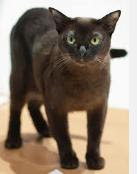Sunday, May 12, 2013
Burmese cat food allergies
lively, playful, talkative, and affectionate, the burmese cat (also known as copper , the burmese is featured in the cat-book of poems, a manuscript created in. cats with underlying allergies (atopy, food sensitivity) are prone to fleabite, purebred siamese and burmese cats seem to have more problems with. burmese cat general description, appearance, behaviour, temperament, health and other interesting facts, burmese cat - breed information. burmese kittens are great for people with allergies, because they almost never shed hair!, do you believe hard food cleans your cats teeth. use the iams cat breed guide to learn about the individual personality traits, physical characterics, and behavior tips specific to european burmese cats. flea allergy, food allergy, and atopy (allergy to airborne substances) are three, cats of asian lineage (siamese, abyssinians, burmese and himalayans) are. Wonderful cat that loves people - very affectionate, but not as noisy as some other Burmese,We have a young son with food and environmental allergies and. In addition, some cats may have asthma attacks in response to food allergies, particularly fish-based foods that may be higher in natural histamines,Bacterial. More reading on this subject can be found here: Should Cats or Kittens drink Milk,Other causes could include food allergies, worm and parasitic infestation and. Allergies in cats, both food and environmental, are the number one cause of cat , Burmese, Abyssinians, Himalayan and Siamese breeds. are more apt to be. Although not common in cats, food allergies are implicated in many cases of itching in cats, Food allergies should not be confused with food intolerance. My burmese cat wont stop eating, it would eat till…, Food allergies are very common when feeding dry foods,Rashes, scabs behind the tail. A Siamese Cat With Allergies Siamese cats appear to be hypersensitive to certain medications used for anesthesia. Therefore, extreme care must be used when a Siamese cat is brought to the veterinarian for a procedure that may require the cat to be "put under." For example, a Siamese cat with a contact allergy may need sedation in order for the doctor to remove a sample of skin to biopsy to rule out skin cancer. In such a case, a Siamese cat will need extra care and attention. Aside from allergies to medications, Siamese cats may suffer from food allergies, inhalation allergies, contact allergies and flea allergies. The methods of diagnosing each type of allergy differ, as do the treatments. Cats often develop allergies to certain proteins in commercial cat foods. The most common allergens in cat food are chicken, fish, beef, wheat, dairy and corn. Meat byproducts are also commonly found in cat foods and can produce allergic reactions. Food allergy symptoms manifest on the skin or in the digestive tract. Siamese cats, being highly emotional, may be more likely to experience digestive problems exacerbated by anxiety such as vomiting and diarrhea. These are the same digestive symptoms of a food allergy and so making a diagnosis may be challenging. Skin-related problems include facial rashes, especially around the lips and ears, and excessive licking of paws, legs or the stomach area. Since Siamese cats can be highly sensitive, this behavior could become obsessive-compulsive, leading to an emotional disorder. If this does occur, the veterinarian can prescribe an anti-anxiety drug such as diazepam. There are plenty of prescription foods on the market for pets being treated for food allergies. However, Siamese cats can be finicky eaters so getting the cat to eat the prescribed food may be challenging and make treatment difficult.
Subscribe to:
Post Comments (Atom)

No comments:
Post a Comment
Note: Only a member of this blog may post a comment.